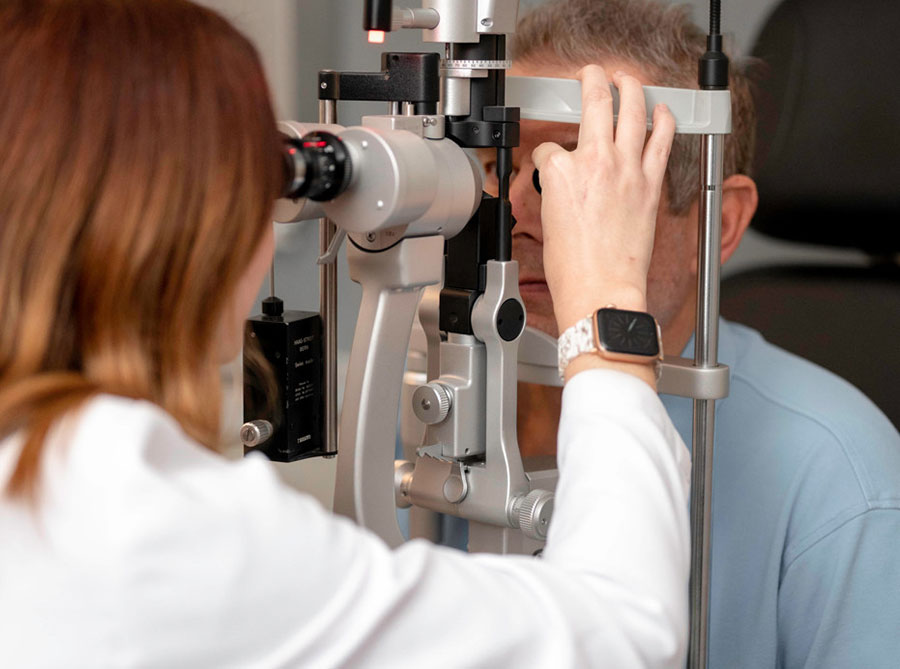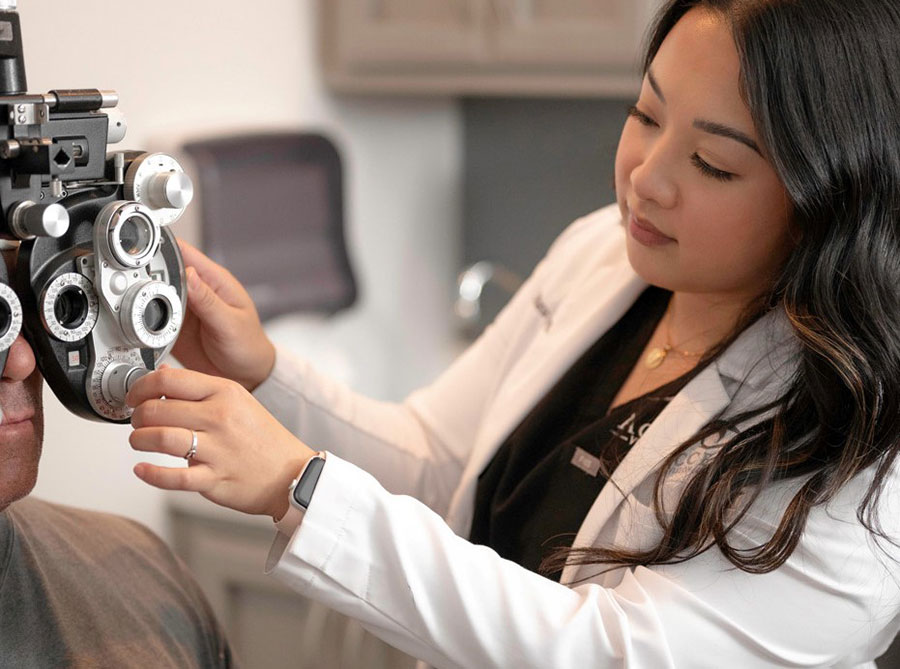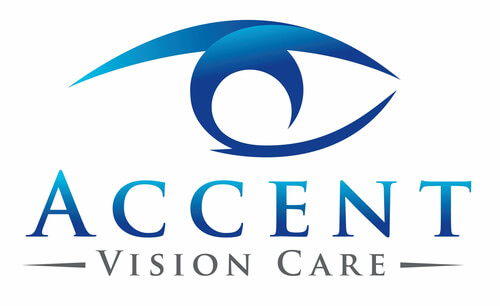Comprehensive Eye Exam


Comprehensive Eye Exams in Gonzales
Eye issues can progress rapidly and be detrimental in the future if left unchecked and undiagnosed, so it is important to establish a regular eye exam routine. The sooner a potential issue is discovered, the more quickly it can be resolved. At our office in Gonzales, we offer comprehensive eye exams to catch any potential problems and provide the right prescription for your eyes.
What Is a Comprehensive Eye Exam?
When you come in for a comprehensive eye exam at Accent Vision Care, you will receive vision screening tests as well as other tests that can help uncover eye disease and other issues. Comprehensive eye exams are a valuable tool for diagnosing issues before they develop to advanced stages and may help to slow down an eye problem’s progression and prevent potentially long-term damage. Routine eye exams are recommended for people of all life stages, regardless of whether a person has had a history of eye issues or vision problems.
Our exams help uncover issues including:
- Farsightedness
- Nearsightedness
- Astigmatism
- Lazy eye
- Crossed eyes
- Eye alignment issues
- Dry eye
- Tunnel vision
- Diabetic retinopathy
- Glaucoma
- Other eye diseases and problems
High blood pressure and high cholesterol can also impact eye health. Routine eye exams can help uncover and treat problems relating to these conditions. If a diagnosis is made, your doctor will develop a treatment or management plan, if necessary, and assist you in moving forward with this plan to support you in living a healthy life.
What Is Included in a Comprehensive Eye Exam?
Our eye exams include a variety of vision and eye health tests to help our doctors gain a full picture of your eyes. These tests offer insight into any problems that may need to be addressed with vision correction or treatment plans.
Our comprehensive eye exams in Gonzales test for:
- Basic vision problems and prescription needs
- Distance vision issues
- Abnormalities in how the eyes work independently
- Abnormalities in how the eyes work together
- Common eye diseases
- The health of the back of the eyes
- Eye pressure and glaucoma
- Obstructions in field of vision
Following your comprehensive eye exam, your optometrist will have obtained the information needed to diagnose any issues and develop a treatment or management plan. Your plan will be tailored to your unique eye health needs.
Schedule Your Eye Exam at Accent Vision Care
Has it been more than a year since your last eye exam? If so, it’s time to schedule your next comprehensive eye exam. At Accent Vision Care, we are committed to helping you with all your eye care needs. Contact us today to schedule your eye exam.
Frequently Asked Questions
Can I do an eye exam online?
In Dr. Lamendola’s professional opinion, only an in-person eye exam by an optometrist can determine a patient’s best vision and fully assess their eye health. According to the American Optometric Association (AOA), a person or company claiming to perform an eye exam without physically examining a patient is offering insufficient, ambiguous information and is contributing to a patient believing-incorrectly-that his/her eye health needs have been met.
What is included in an eye exam?
Dr. Uong says an eye exam will include a series of tests to evaluate your vision and your ocular health. Visual skills such as eye movements, tracking abilities, eye alignment, peripheral awareness, eye focusing, and visual acuity will be assessed at your eye exam. Your optometrist will test your vision with trial lenses to accurately prescribe spectacles to sharpen your vision, as well as examine the front and back of the eyes through a microscope for any signs of ocular diseases.
What diseases can be detected in an eye exam?
In Dr. Uong’s words, an eye exam can detect ocular surface diseases as well as retinal diseases at their earliest stages. Ocular surface diseases such as dry eyes, keratoconus, and conjunctivitis can be well managed at our clinic. We also have the technology to monitor retinal diseases including glaucoma, macular degeneration, and diabetic retinopathy.
How often do I need an eye exam?
Dr. Uong’s professional opinion is that yearly eye exams are recommended to detect any changes in your glasses and contact lenses prescription, as well as your eye health. Patients with ocular diseases (such as glaucoma, diabetic retinopathy, macular degeneration, dry eyes, myopia management, etc.) will require more frequent eye exams to properly monitor any changes. When an eye problem is detected early, it increases the chances of successful treatment.
Is it necessary for the doctor to dilate my pupils during the exam?
Dr. Harris says it is necessary to examine the health of the retina during every comprehensive exam to diagnose common diseases and conditions possibly at their earliest stages, like diabetes, high blood pressure, macular degeneration, retinal detachment, and glaucoma. This can be done by either dilating or taking Optomap retinal images. With dilation, the pupils open wide enough for the doctor to be able to view the retina. However, Optomap gives a larger, wider, documented view. Sometimes, we still need to dilate the eyes to view a cataract fully, evaluate floaters, or get a 3D view of a retinal lesion to assess depth.
What is Myopia Control?
Various forms of myopia control help slow or stop the progression of myopia, preventing nearsightedness from getting worse. One form of myopia control treatment is available through MiSight® contacts, the first and only soft contact lenses that are FDA approved to slow the progression of myopia in children age 8-12 at the start of treatment. Approval from the Food and Drug Administration (FDA) means that the lenses have been tested over a long period and have met all the safety requirements established.
At Accent Vision Care, we are certified providers of MiSight®1 Day contact lenses. This form of myopia management is safe and proven to be effective. Kids ages 8-12 wearing MiSight® 1-day contact lenses experienced an average of 59 percent reduction of myopia progression when used over three years.²
Myopia Control in Gonzales
Interested in learning more about myopia management? Schedule an eye exam for your child at our Gonzales eye care center and let us know you want to learn more about myopia control and MiSight®1 Day for Myopia Control contact lenses. Our optometrists will examine your child’s eyes and present suitable next steps for their needs.
Sources:
- WHO – The Impact of Myopia and High Myopia
- Cooper Vision- Learn About Myopia

